Increase the success of your events with feedback
easyfeedback provides you with a simple and flexible tool for creating feedback forms for seminar surveys, workshops, training courses and events. Regardless of how many seminars, lecturers or other criteria are to be evaluated – we have extensive experience in this area.




Focus on the success of the event
Feedback from course and seminar participants is an important part of controlling after events, seminars or workshops. The feedback collected gives you direct insight into the success of your seminar or event. This feedback is particularly crucial in the training and further education sector in order to continuously offer a high-quality service and position yourself as an expert in this segment.
Only if your participants or visitors are satisfied will they come back and recommend you to others. Satisfaction is a key factor for the reputation of your event.
It starts with details such as the politeness of the reception or the cleanliness of the location.
The structure of the seminar, the time schedule and the services offered are also decisive factors that contribute to satisfaction.
A participant survey also provides valuable insights into the expectations of the participants, the skills of the speakers and the overall quality of your service.
Conducting such a survey is straightforward. In addition to the course topics and their comprehensibility, aspects such as the friendliness of the lecturer or the active involvement of the participants play an important role.
General conditions such as cleanliness, time management and general feedback can also be surveyed. This feedback enables you to continuously develop yourself further.
Application areas of an event survey:
• Seminar feedback
• Event feedback
• Event registration
• Event planning
• Online event feedback
• Trade show feedback
• Travel planning
Goals of an event survey:
• Determining the satisfaction of the participants
• Achieving ISO certification
• Improvement of the offered service
• Examination of professional competence
• Quality management and offer optimization
• Collection of statistical data
• Recording of services
• Shifting the focus of the content
• Determination of participant wishes and needs
Why easyfeedback



Universally applicable
easyfeedback is a flexible tool that can be used to conduct surveys in the entire event sector. Whether events, seminars, trade fairs, congresses or festivals.
Cost effective solution
Due to the wide range of possible uses and the different plans, easyfeedback is very attractively priced as a solution for surveys.
German Server & ISO Certification
The protection of your data and trust has the highest priority. The server location is and remains Germany. easyfeedback itself is certified according to TISAX and its service providers according to ISO-27001.
Optimization starts with the right questions
In order to derive optimizations from the participants’ answers, it is important to ask the right questions in the right context. With prefabricated surveys, you can create your customized event/seminar survey in no time at all.
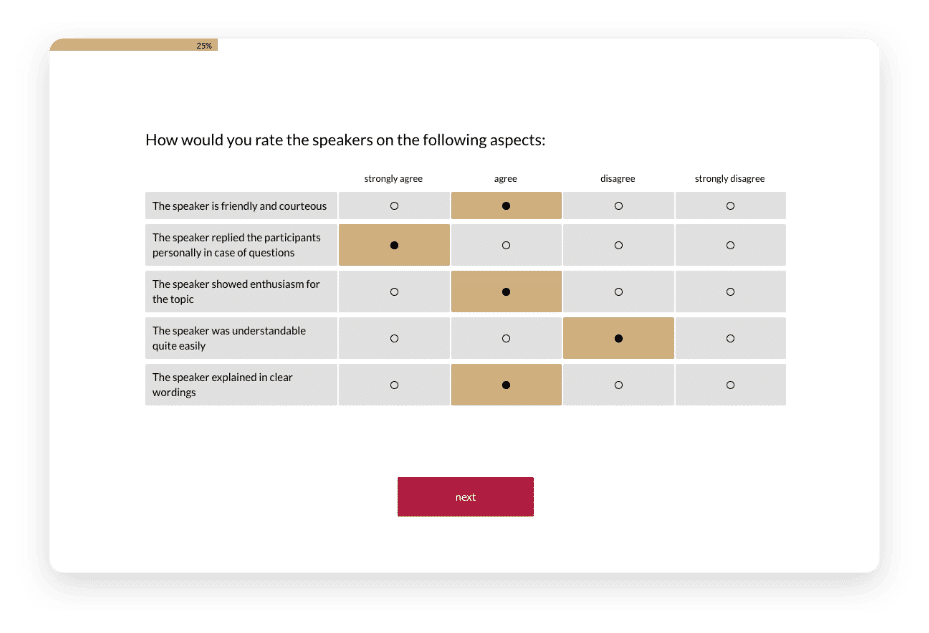
Seminar Feedback
Were the topics interesting for the participants? Did the speaker generate enthusiasm? Are the participants satisfied? Use this template to determine the success of your seminar.
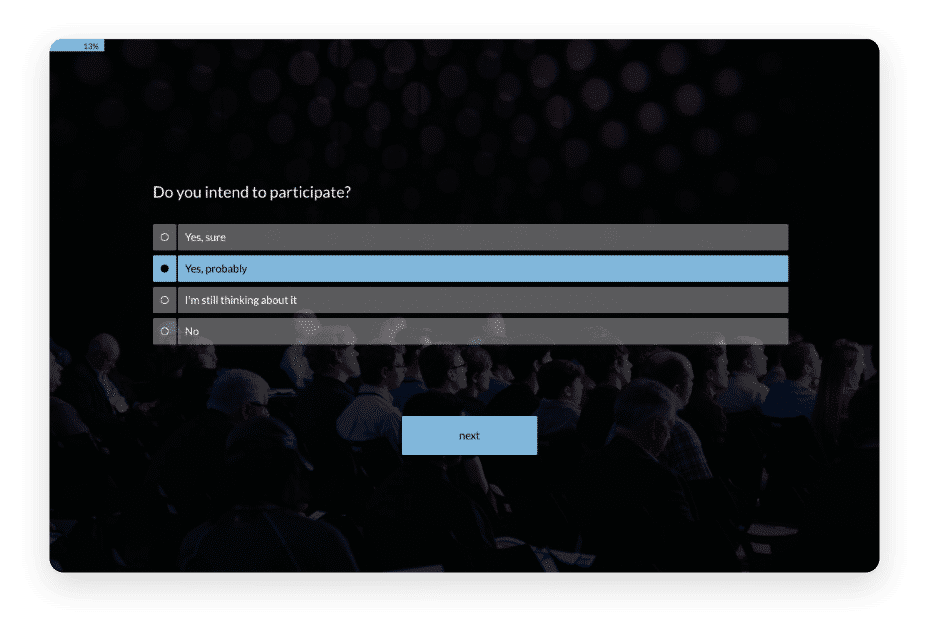
Event Planning
How many participants will attend? Are there any wishes of the participants? Do the participants need more information in advance? Plan your event with this template.
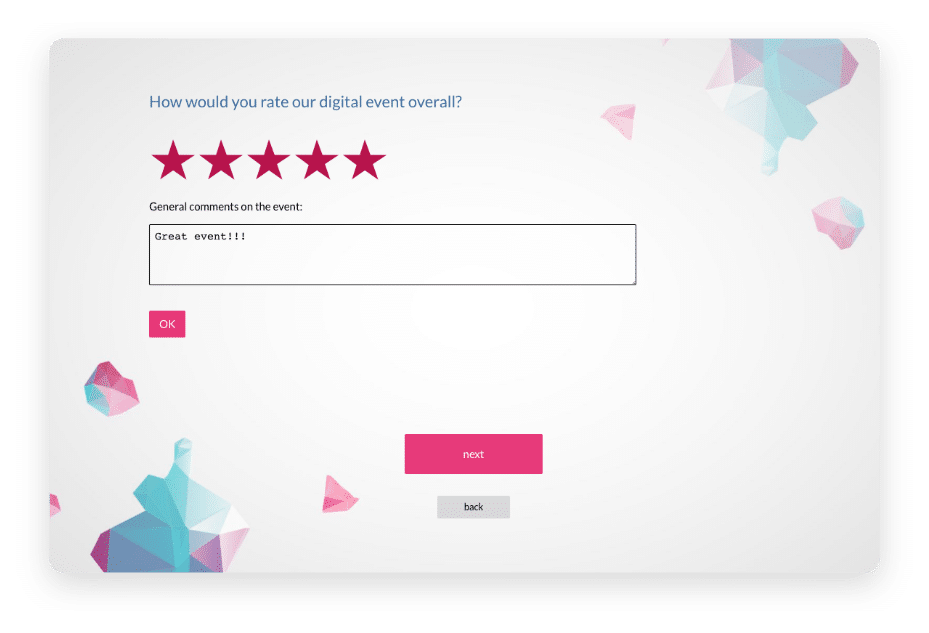
Feedback Online Event
Are your participants satisfied or enthusiastic? Will they recommend your event to others? Where can you improve? Find out with this template.
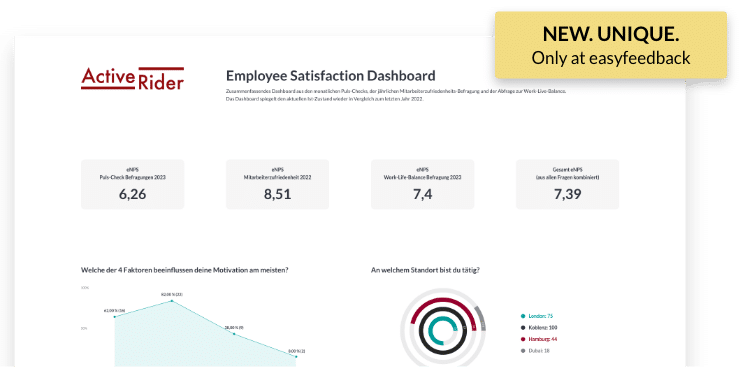
Your brand. Your appearance.
Logo, color, font – the elementary design elements of your brand.
Simply transfer the corporate design to your online survey.

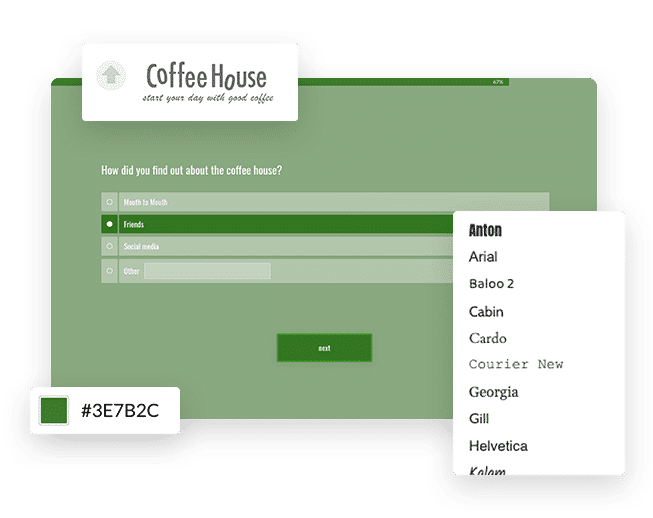
Layout configurator
Mobile optimized usability
CSS-Editor
Feedback in real time
The goal of the event/seminar survey is to find out how the participants perceived your event. With the comprehensive evaluation you get the feedback in real time.

Total or segmented display
Comparative representation
Share reports
Expert knowledge on event/seminar surveys
To help you conduct your event/seminar survey as effectively as possible, we provide expert knowledge.




easyfeedback Blog - Experience Management
How to use surveys correctly in experience management.

Video instructions
Create, invite and evaluate survey – all explained for you in individual videos.
Almost everything you need to know about seminar surveys
What does seminar evaluation mean? Technical term, meaning and goal
Basically, a seminar evaluation is a subjective judgement of an interactive learning and teaching event in which a seminar leader or trainer imparts and deepens knowledge on a specific topic to a group of people. The participants of the seminar are actively involved in the learning and teaching event. This form of knowledge transfer is often offered for professional training.
Mostly a seminar is a one-time event, which is carried out in one day. Depending on the content of the topic and the intensity, it can, however, also be spread over several days. In addition to theoretical content, practical parts such as role-plays, teamwork or discussion groups are also included in the learning and teaching event, for a more effective learning experience. At the end of each seminar there should be a seminar evaluation that captures the impressions of a participant.
The goal of the seminar evaluation is to use the insights and potential for improvement gained from the evaluation to sustainably increase and maintain the quality of the seminar offered.
What is the difference between a seminar, a workshop and a conference?
The three types of knowledge transfer differ fundamentally in the methodology of how knowledge is taught.
In a seminar , the contents of the event are taught in stages over a longer period of time. For this purpose, both theoretical and practical contents are used for teaching.
A workshop, on the other hand, is an event similar to a seminar, but in which the content of a specific topic is developed by the participants themselves, in cooperation and moderation with the workshop leader. The elaboration is carried out with the help of practical exercises such as presentations and discussion groups.
A conference (synonyms: congress or meeting) differs from a seminar in that it is planned over several days, is a group of several people working on the same topic and knowledge transfer takes place through lectures, presentations, workshops and panel discussions.
Why do I need a seminar evaluation?
By means of a seminar evaluation, you will gain important insights into the quality of the event and find out which optimization potentials still exist from the participants’ point of view in order to improve the offer and the quality. This includes not only the evaluation of the theoretical contents and practical methods, but also the assessment and measurement of the ability of the seminar leader, as a lecturer and coach, as well as process and organizational framework conditions.
When is the best time to collect seminar feedback? Before the start of the seminar or immediately afterwards, when everyone is at home? During the event? What are the advantages and disadvantages of these options?
There are different times to obtain appropriate feedback from the seminar participants. You can, for example, ask the participants about their expectations, interests and needs a few days or weeks before the seminar starts in order to adapt the seminar based on this. In this way, you will increase the success of your seminar immensely, since you as a service provider will meet exactly the expectations that the seminar should ultimately be about.
Another possibility to get feedback from the seminar participants would be on the seminar day itself. For example, you could collect feedback after each item on the programme, during coffee breaks or before the last item on the seminar programme. This has the advantage that, on the one hand, the seminar participants are likely to answer the questions on the questionnaire more attentively and carefully. In addition, instead of a long questionnaire, you can pack your questions into several short interviews and distribute them during the individual breaks for completion. The results could be discussed at the final meeting and individual points could be dealt with more specifically.
Another way to get the feedback that is so important for you would be a few days (not weeks) later after the seminar has taken place. At that time, the seminar participant has most likely processed the teaching and learning content conveyed in the seminar, possibly gained initial practical experience in its implementation and formed a firm opinion about the seminar offered.
It would be even better, however, to use surveys at all points of the event (before, during and after the seminar) instead of just collecting feedback at a specific point in time during the seminar. This way, you will receive continuous feedback and can continuously adapt the seminar in a way that promises success. Don’t be afraid of the possibilities of surveys and use them to optimize your seminar to an all-round successful experience for you and the participants.
Regardless of which option you choose for obtaining feedback, it is important that you make your event visitors aware of the importance of the questionnaire. After all, the aim of the questionnaire is to ensure and increase the quality of your seminar in the long term. Above all, give your seminar evaluators enough time to fill out the questionnaire carefully. Especially if you distribute it after the event. He will most likely not be able to give immediate feedback, but you should still define a survey period with an end date for submission.
Finally, you must also evaluate the questionnaire and define and implement suitable optimization measures.
Tips for evaluating your seminar feedback are available here.
How do I get my participants to participate in the seminar evaluation?
First, you can and should make the participant of your seminar survey aware of the importance and goal of participating. Give them the feeling that their opinion is important for the future success of the seminar. On the other hand, you can also motivate participants to take part with incentives, in the form of vouchers or prize draws.
But also from a methodological point of view, you can encourage and motivate seminar participants to give their opinion on the seminar held. This can be done by the length of the questionnaire, its design or the way in which you ask the participants. The latter is particularly interesting, as you can also obtain feedback in a playful way, for example, by means of a quiz.
Furthermore, you can increase the motivation to participate by the type of survey itself. You can conduct surveys either in a classic way via pen & paper or online with a modern and unique participant experience.
How long should the seminar evaluation questionnaire be?
How long a questionnaire for the evaluation of a seminar should be cannot be said in general terms. In general, a questionnaire should be kept as short as possible, as the participants of a seminar usually do not have the time or desire to fill it out. Generally speaking, the longer the questionnaire, the less willing the participants are to fill it out carefully and honestly. In the end, this has a negative effect on the quality of the answers given and thus on the evaluation and interpretation of the results.
So in order to obtain good usable data from a seminar evaluation, the feedback questionnaire should not contain too many questions and should be equipped with simple questions and question types if possible. If you need many questions for a thorough evaluation of your seminar, another option would be to distribute these questions in several short questionnaires and to output them at different times.
What content should be asked for in the seminar evaluation?
This depends strongly on the structure and content of your seminar. Nevertheless, the following structure of a seminar questionnaire can be defined as a basic framework:
1. Evaluation of the organisation and general conditions
Get feedback from seminar participants regarding the venue, equipment or catering and more. The answers you receive will give you an excellent opportunity to create the environment as well as the framework for an educationally supportive learning atmosphere.
2. Evaluation of the seminar leader
The success of a seminar depends strongly on the seminar leader. As a moderator and teacher, he or she must have the competence to teach didactically and also have social skills in order to best fulfil the educational function of the event. Therefore, the seminar leader himself must be evaluated after each event in order to constantly improve the quality of his teaching.
3. Evaluation of the contents and the methodical design
Theoretical as well as practical contents of a seminar should not bore the participant and hinder the learning process. Make sure that your seminar is varied and provides added value for the participants. Therefore, it is best to ask before the event, about the individual interests, wishes and expectations of each participant. After the event, you will then have the opportunity to measure the satisfaction and the degree to which the expectations were fulfilled.
4. Praise, criticism and opportunities for improvement
Right here, is the gold of her seminar interview. So don’t be afraid to ask what you can improve on your course in the future. Only through the constructive feedback of your participants you can constantly improve the quality of your seminar.
5. General information
At the end of the questionnaire, you have the opportunity to obtain further relevant information about the participant group. For example, ask about the reasons for participation or about their current professional activities. Such information will help you to market the seminar more effectively to your target groups.
How to collect seminar feedback in an automated way?
In addition to the feedback from the seminar evaluations, the organisation is also involved. If you as a seminar provider offer a large number of seminars, the integration of Feedback Management must be as easy and convenient as possible.
At this point easyfeedback offers you different methods. On the one hand, you can use automated parameters on the survey link to control participation via your own system, or you can use the API (connection) provided for your favorite tool and include the invitation and evaluation in your system landscape.
How seminar evaluations help improve customer or employee experience and how that is connected?
A successful seminar can definitely increase the own customer (customer experience) as well as the employee experience of the customer (mostly companies).
Both customer and employee experience management are clearly about satisfying the needs and wishes of each individual in the best possible way. If you continuously optimize your seminar with the help of seminar evaluations, you create a positive added value for yourself, your customers and ultimately for the participants.
The goal should be to completely fulfill the (further) educational purpose of a seminar in line with expectations. Especially customers who purchase your service, for example to train their employees in their tasks, should be satisfied with your event in the end. This will have a lasting effect on the booking of further seminars by the same customer.
But also the trained employees would be satisfied with your event, as long as you convey the contents of the seminar in a way that promotes learning and take individual wishes and interests into account. A successful seminar can pay off for companies by increasing employee satisfaction and for you by positive recommendation.
More than a survey tool

Excellent support
You are a professional or you are creating a event surveys for the first time. If you need help, our excellent support is here to help.

Certified IT security
To protect your data, easyfeedback has been certified and only works with certified service providers.

Thousand integrations
Connect to thousands of apps to more efficiently connect your data to other tools in a workflow.



